- Home
- David Adams
Dusk
Dusk Read online
Contents
Title Page
Story
The Lacunaverse
Dusk
A short story
“One’s convictions should be proportional to one’s evidence.”
—Sam Harris
THE BOOK
I knocked twice on the heavy oak of Professor Rajaseka’s door. I always knocked twice. It was the only way he would answer. To the best of my knowledge he didn’t have OCD, not any kind of disorder or mental issue. That was just how he liked it. A creature of habit.
“Please state your full name,” he said from within. Typical.
“It’s me,” I said. “I hope you have a good reason for calling me into work at 4:00am on a Sunday, Professor. Rebecca has soccer in two hours.”
“Please state your full name.”
Now I was annoyed. Rajaseka was always weird and strange with his semi-ritualised habits, but at this hour of the day I had little patience for it. In my locker was a bag full of soccer gear and my daughter would be wondering why I wasn’t there when she woke up.
“Doctor Valarie Delacroix. Now please open the door, Professor.”
The wooden door swung open with a soft moan. Rajaseka’s face, almost hidden in the low light, beckoned me inside.
“I have something very important to show you,” he said, a tremor in his voice I had not ever heard before. “I can’t let anyone else see it.”
His office reeked of cigarette smoke and liquor. I squinted as I stepped inside, partly from the lack of light, partly from the smell.
“What is it?” I asked, somewhat rhetorically. The sooner I could be gone from there the better.
Nervously, Rajaseka fiddled with the lamp on his desk, turning it on and angling it despite the overwhelming ambient glare. He was dishevelled. Jeans streaked with grime. How long since he had showered? “May I ask you a question, Doctor Delacroix?”
“I fear you already have,” I said, although I suspect the humour was lost on him. He was always so literal. “Yes.”
“Are you religious?”
He had dragged me out of bed for this? “No. There’s no evidence that any of the so-called holy books contain any truth to them, and the amount of demonstrable errors they possess denies them any credibility.”
“Interesting. Most interesting.” He rummaged around on his desk in the gloom, and then switched on the fluorescent. I shielded my eyes. Everything was too bright. “Come, see,” he said. “The dig in the Ahmar Mountains found something near Lake Zway. They air-freighted it to me marked Urgent. When I got it I could see why.”
Vague memories of the dig’s reports filtered through my mind. I hadn’t had my coffee yet. “This is the one on the Ethiopian Plateau, yes?”
He glared at me with his dark eyes, seen through the round orbs of his spectacles. “Do you actually read my reports?”
“Yes,” I said, “but there are so many.” I moved over to his side. On his desk, laid haphazardly across a mountain of junk, was a stack of papyrus parchments sealed in a zip-lock bag.
“Is this it?”
“Yes,” he said, pulling up a heavy book. Paperback. One of those print-on-demand deals. The front cover was a picture of space, with a planet in the top left hand corner of the screen. In the centre of the image, in large block letters, was a title. DUSK. “I had the item digitised, printed and bound. We can’t touch the original because of its age.”
The parchments were yellowed and broken, but in remarkable shape. Written on them was writing in a language I didn’t speak. I had seen similar things before, in Chinese digs. “Mongolian dialect? Impressive. That parchment must be hundreds and hundreds of years old.”
“Far more interesting than that,” he said. “They’re petroglyphs, and they are from the Paleolithic period.”
My interest faded and was replaced with mild annoyance. “Professor... you and I both know there was no writing material in the Stone Age.”
“We both knew that, yes.”
Perhaps humouring him would get me out of here faster. “Have you had the document radio-metrically dated?”
“Of course.” As though brushing off my questions, he opened the book to the first page. “But we don’t need to. There’s more evidence. This book is going to change everything.”
“If you can prove that this book existed in a time when cave men built weapons out of rocks, Professor, this is one of the most important discoveries of this century.” I laid my hand across the book, obscuring the pages. “Look. It’s early, and you’re...” I recoiled from the smell of his breath. “Clearly quite emotional. Why don’t we deal with this tomorrow?”
His face had a stubborn seriousness on it that shut down my request before he even spoke. “I’m afraid we don’t have that much time.”
“What do you mean?”
He brushed my hand away as one might an annoying bug. “This page. This very first page. It has information about fire. How to start it. How to keep it burning.”
“Okay.”
He ran his fingers across the paper until it reached the edge, and turned the page. “Page two? It shows how to create basic shelters. Page three? Spears, from sharpened wood. Four? The bow.” The pages turned fast, Rajaseka’s fingers flying. “Rope. Pottery. The fucking wheel. Papyrus. And here: this page shows how to create alcohol from grain. That knowledge wasn’t available until the early Neolithic.”
I struggled to understand what he was telling me. “So you’re saying that on your desk is an archaeological find, printed on a material that’s two and a half million years older than it should be, regarding the creation of alcohol... a substance that’s only twelve thousand years old?”
“Plainly, yes.” He affixed a curious stare at me, at once triumphant and terrified. “I haven’t finished.” He turned the page. “Here’s information about crop rotation. 6,000 BCE. Bronze, 3,000 BCE. The foresail, 700 BCE. Here, right on the turn of the century... the water mill.”
“Professor,” I said wearily. “There’s no way you can believe this.”
He spun through the pages until he found a dog-eared corner, then turned the book around and showed me. It was a section around the middle. “See for yourself.”
Reluctantly—I didn’t want to encourage him—I took the book. On the open page were complex symbols and graphs, circles and dots and lines that formed a complex symmetry but were almost too faded to make out.
“What am I looking at, doctor?”
“Instructions on how to build an atomic bomb. Instructions that would work.”
“In the Stone Age?”I couldn’t help myself. I laughed. “Impossible.”
“Miss Delacroix.” He pushed up his spectacles. “If you think that is the most shocking thing you will be told today, I am afraid I have bad news for you.”
“What do you mean?”
He reached over to the book and turned more pages. “Look. Computers. Microprocessors. Vaccines.”
His energy, enthusiasm, was clear. I smiled, understanding it all, suddenly. “Professor, I’m afraid someone is playing a trick on you.”
“We had the document carbon 14 dated.”
“So you said, but it’s probably a prank by someone in the faculty. Remember when Marcus tried to convince everyone that arrowhead was found inside—”
“Six times. In four different laboratories. The ink matches up with contemporary inks. The damage from the sun is consistent. The amount of radiocarbon in the paper matches its age. The first atomic detonations irrevocably changed our atmosphere, Doctor Delacroix.”
“Yes I know,” I said. “It’s almost like I’m a doctor of Archeology or something.”
His shoulders slumped. “You don’t believe me.”
How could I? “Professor... someone has gone to incredible effort, ti
me, and expense to fool you. This parchment. It simply can’t be what you’re saying it is.” This was no longer funny. I wanted to just shake my head at the stupidity of it. “You can’t possibly tell me that a Stone Age culture knew how to split the atom.”
“That and more.”
The sun was starting to come up outside. Rebecca would want her breakfast. I almost tried to find some way to excuse myself, but a few minutes more wouldn’t kill me. “More? How do you mean?”
“The knowledge in this book is ordered roughly in the same chronology as humans discovered them. I say roughly because the discovery of certain things—pottery, writing, electricity—was made, and re-made, several times by different cultures around the world, and the precise dates are sometimes not known. But it is roughly correct.”
“Which proves nothing as whoever made this book may have simply made logical guesses. A day’s reading on the Internet would have told them enough. They wanted you to find this... thing, this Stone Age Wikipedia, remarkable.”
“Interesting you should say that.” He turned a handful of pages beyond where we were, and pointed. “These runes right here. These are one of the few pages that don’t contain technology. They are dated for today, in the ancient Egyptian calendar—which the stone-age Ethiopians would have had no access too—and they read: the book of Dusk will be found by...” His voice wavered. “Doctor Rajaseka and Valarie Delacroix. With their eyes on the past, far too late will they discover the truth in their future.”
This didn’t impress me. “It’s hardly anything more than good guesswork. I practically live at this place.”
“So why is today interesting?” Hamilton leaned over his desk. “I only called you an hour ago. How did the words get there? This parchment has been in my office for a week.”
I had no idea what to say. “Maybe... whoever did this just added it this morning.”
“It has never left my side since I called you.”
Judging by his mobile’s position on top of the mountain of garbage that was his desk, I could almost believe him. Now he had my interest. “So wait,” I said. “We’re not even half way through the book yet and we’re already splitting the atom. What’s next?”
“That is why I called you here.” His voice was grave. “The page after this one... well, things might get a little strange.”
“Professor, you are presenting remarkable evidence that cavemen had the knowledge to build Facebook. I doubt what’s next could be stranger than this.”
He turned the page. This page had only a single phrase in the middle. No more than a handful of words. No graphs. No diagrams. Nothing.
Rajaseka, as though reading my thoughts, translated. “It says, ‘The moment of singular misery’.”
“What does that mean?”
“I haven’t a clue, to be honest. But it sounds... ominous. The next page is an invention again. A type of syringe that doesn’t pierce the skin.”
“Okay.”
“The next is a way of filtering virus spores from water.”
“... okay.”
He flicked to the next page. “This page details a way to burn the dead without contaminating ground water. Then a new way of quarantining corpses.”
It didn’t make sense. “Quarantining corpses? You mean, isolating bodies from healthy populations?”
“Unsure. Quarantining corpses is literally what it says.”
It made no sense. “What’s next?”
“Some method of treating blood-borne retroviruses. Three methods, actually, each commenting on how the previous method is no longer effective.”
Viruses. “I’m starting to see a trend here.”
“So did I at this point. The next? How to boil infected human meat for consumption using limited tools. After that? Ways of scraping small amounts of edible mold from the stones.” Page after page. “How to reduce blood loss from infected lungs. How to ease the suffering of the dying without expending ammunition. The best way to repel the infected en-masse. On and on...”
Necessity was the mother of invention. What kind of drastic changes in the world might require the development of such techniques? Where were the computers? High-speed broadband? Satellites?
Rajaseka flipped through the pages until he came right to the end. There, he waited.
“What does it say?” I almost didn’t want to know. Whoever had done this prank had gotten me good.
“Dusk.” He showed me the glyph, centred in the page without context. “It just says ‘dusk’. Literally, the end of the day, a world with no more light.”
“So,” I said, trying to piece everything together in my head. “You’re telling me, that back in the Stone Age, whoever wrote this book could tell the future. Knew who you and I were going to be. Knew atomic theory and computers and everything. And… then said after today everything is going to be very bad.”
“The evidence seems to suggest that this person could. Unless one of my underpaid, overtaxed workmates went to the considerable time and effort to not only create this book of perfectly period-precise language, grammar and style, and create it well enough to fool the premier expert on the subject, had all the equipment at a half-dozen laboratories around the world sabotaged simultaneously—months and months of effort, assuming it were even possible—which we either accept, or be confronted by the possibility that these results are genuine.”
I suddenly wanted to leave but for a whole new set of reasons. “When is that day, this moment of singular misery?”
Rajaseka checked his watch, then looked back at me, his expression an unreadable mixture of excitement and fear. “About six minutes ago. The very second you walked through that door, now that I think about it.”
My phone vibrated in my pocket. Out of instinct I pulled it out and unlocked it.
My Facebook profile was going mental. Over sixty posts in the last few minutes. I scrolled through some of the messages.
Have u heard what’s going on?
Sis turn on the news
Holy shit have u seen dat shit in Austin?
More messages flooded in as I read. Showing Rajaseka, I tapped on one of the links. It was to CNN. Across the page, in huge letters, was the headlining news article. It took a long time to load and nothing else was there. It reminded me of the site during 9/11.
INFECTION IN DOWNTOWN AUSTIN
BEDLAM is unfurling in downtown Austin. What were first thought to be civic demonstrations protesting the use of a new form of the AIRVAC(tm), a new medical tool which some claim has links to deaths in infants and children, are now confirmed to be much more widespread. The CDC has released a brief statement indicating an infection of unknown origin is spreading throughout the population. Symptoms of this suspected-virus are:
- Restlessness
- Chorea-acanthocytosis (uncontrolled biting of the tongue and lips)
- Loss of language functions and reason
- Extreme irritability or psychosis
The CDC is advising all residents to remain indoors and avoid contact with infected persons until...
I tried scrolling for more but the cellular network couldn’t provide me with bits fast enough even though I had full bars. It must have been overloaded.
“This... this is probably unrelated.”
“Did you see the thing about the syringe?”
I nibbled on a knuckle, something I only did when I was worried. When Rebecca was late for soccer practice, or was misbehaving in school, or when my lab results didn’t match my predictions. “Yeah.” I decided to play it safe. “I’m going to go get Rebecca. If there are riots, she’s not going to soccer.”
“Okay,” said Rajaseka. He put down the book and brushed through some of the debris on his table, almost burrowing through it. He dipped his hand in deep and withdrew a revolver. “Take this.”
I had never seen a real gun before. I stepped away from him, wrapping my arms around myself. “Holy shit, Rajaseka! Is that thing loaded?”
He opened the device a
nd I could see its chambers were full. “It is now.” He clicked it closed and handed it to me grip-first.
I shook my head. “No. No, I hate guns.”
“So says everyone who lives a comfortable existence free from danger. I grew up in the ghettos, Doctor. This was a valuable tool for me during those younger years and now I want you to have it.”
“But what about you?”
Rajaseka smiled a strange smile. “I will have no need of it shortly.”
I only noticed, then, that his other hand had a pistol too. An automatic. Smaller. Weaker. Still offering me the revolver, he raised the automatic to his temple.
“Doctor, what are you—”
Bang.
I screamed.
The slump of a body. Ringing in my ears from the gunshot. The smell of blood and smoke.
I didn’t want to open my eyes. Blind, stumbling, I searched for the handle to Rajaseka’s door. Found it. I yanked it open.
The book. I should take the book. Rajaseka had shot himself because of its implications. I owed him that at least.
It meant I would have to look. So I did.
I immediately regretted that decision.
I’d never seen what bullets did to humans before. I’d always found the comic exaggeration of movies absurd, where when people were shot they kind of exploded.
I didn’t find it absurd anymore. His head was in pieces, strewn all over his office. On the walls. On the ceiling. On the desk.
On me.
As though it were made of lava, I gingerly snatched up the book and then forced myself with trembling hand to grab Rajaseka’s revolver, still clutched in his bloody hand. I couldn’t take the automatic. I knew I would regret this later, but I just couldn’t.
With the book clutched against my chest I ran out of the brightly lit office, into the main hallway. The sun was coming up, bathing everything with little fingers of light as the world greeted another day.
Smoke billowed from distant fires. In the distance, I could hear the tuneless wail of sirens. Helicopters buzzed overhead. The road out of the university was quiet and peaceful but it wouldn’t stay that way. If there were busses, I couldn’t rely on them. I didn’t own a car.

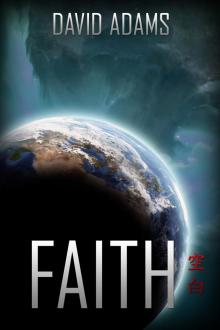 Faith
Faith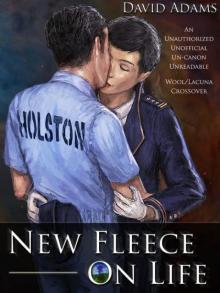 New Fleece on Life
New Fleece on Life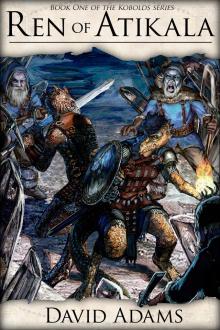 Ren of Atikala
Ren of Atikala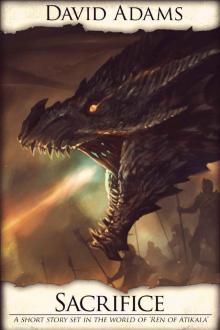 Sacrifice (Kobolds)
Sacrifice (Kobolds) Dusk
Dusk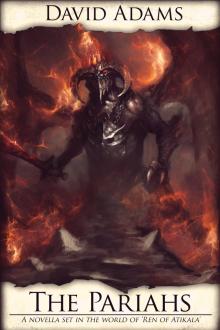 The Pariahs
The Pariahs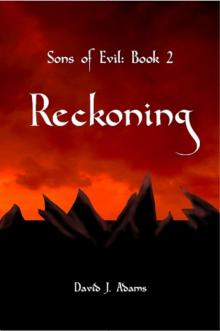 Reckoning
Reckoning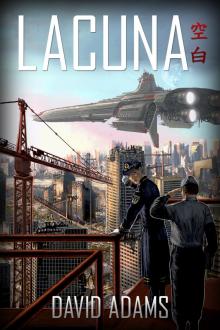 Lacuna
Lacuna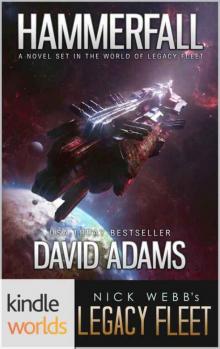 Hammerfall
Hammerfall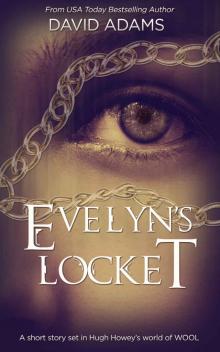 Evelyn's Locket
Evelyn's Locket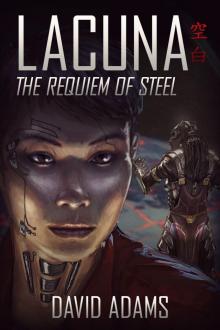 The Requiem of Steel
The Requiem of Steel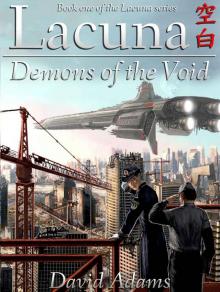 Lacuna: Demons of the Void
Lacuna: Demons of the Void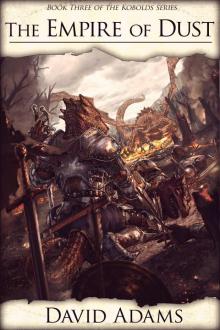 Ren of Atikala: The Empire of Dust
Ren of Atikala: The Empire of Dust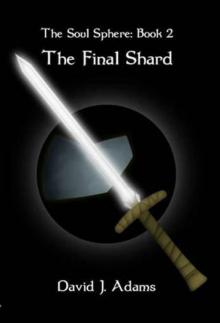 The Soul Sphere: Book 02 - The Final Shard
The Soul Sphere: Book 02 - The Final Shard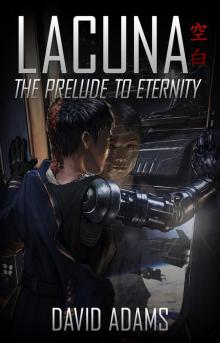 Lacuna: The Prelude to Eternity
Lacuna: The Prelude to Eternity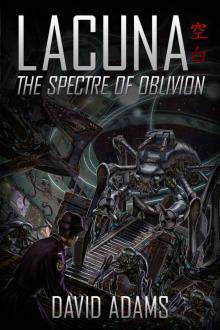 Lacuna: The Spectre of Oblivion
Lacuna: The Spectre of Oblivion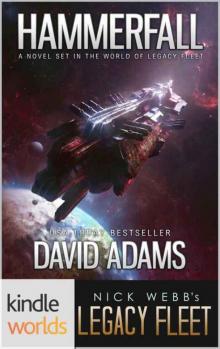 Legacy Fleet: Hammerfall (Kindle Worlds) (Khorsky Book 1)
Legacy Fleet: Hammerfall (Kindle Worlds) (Khorsky Book 1)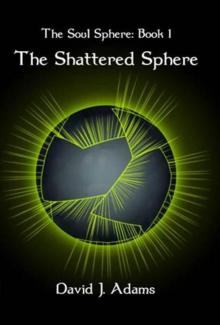 The Soul Sphere: Book 01 - The Shattered Sphere
The Soul Sphere: Book 01 - The Shattered Sphere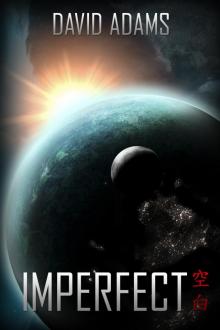 Imperfect
Imperfect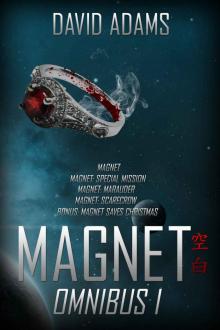 Magnet Omnibus I (Lacuna)
Magnet Omnibus I (Lacuna)